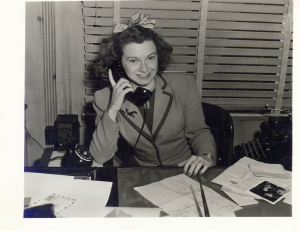
February 18, 2017, is the 100th anniversary of the birthday of Sylvia Wallace, my mother, a woman who was ahead of her time.
She was born Sylvia Kahn in the Bronx, where her parents owned a candy store with a soda fountain, and her father ran numbers on the side. Sylvia began working there when she was 12 years old. She was unusually smart and graduated from high school at the age of 16. She went to work as a secretary for Chrysler, but dreamed of being part of the publishing industry. She got a job in the mailroom of Dell Publishing, but was transferred just weeks later to the editorial department as a copywriter. Her talent was quickly recognized.
In 1940, at the age of 23, Dell sent her to Hollywood to become Dell’s West Coast editor. It was the first time she had been west of the Hudson River. Her main responsibility was for the movie magazine Modern Screen.
In June 1941, Sylvia married my father, Irving Wallace, who was, at that time, a struggling free-lance journalist. In 1947, she left Dell, and she and my father traveled in Europe, writing magazine articles. I was born the following year, so my mother tried to stay home and be a housewife. She was not happy in this role. After being reassured by doctors that it was okay to be a working mother, she began ghostwriting for the likes of gossip columnists Hedda Hopper and Sheila Graham, who, in my mother’s words, “considered my writing some of the best they had ever done.”
In 1954, Sylvia returned to full-time editorial work as the West Coast editor of Photoplay magazine. In her work in Hollywood, she worked regularly with famous actresses and actors, including Elizabeth Taylor, Joan Crawford, Doris Day, Errol Flynn, Cary Grant, Ronald Reagan, etc. For me, as a little boy, the highlight of this period was when she took me with her when she interviewed Fess Parker. These other celebrities might have been more famous, but to meet the actor who played Davy Crockett on TV, that just couldn’t be beat.
Sometimes I would visit my mother at work. She oversaw a staff of writers, photographers and secretaries. I had no idea that, in the 1950s, it was unusual for a woman to be the boss of so many people.
My mother liked to tell the story that after my sister, Amy, was born in 1955, she came under increasing pressure to quit work and become a stay-at-home mom. And my father was embarrassed that his wife continued to work even though she had two children. So she resigned. Such was life in the United States in the 1950s.
But after my mother died in 2006, I uncovered letters written my mother and my father. My sister and I were stunned to discover that my mother had actually been laid off when Dell had a change of leadership back in New York. My father wrote to numerous friends to see if there were any job openings for my mother in the publishing industry. Fake news is common now, but when it hits your own family, it’s hard to adjust.
Still, when a feminist movement began to gain traction in the United States in the 1970s, my mother came to believe that she had been born too soon. She wrote outlines for books about famous women in history and about the defeat of the Equal Rights Amendment, but they were never published.
When my father became famous as a novelist, my mother felt her “personal identity wash away. Admirers of Irving Wallace books edged me into corners; at parties, guests met me for the sixth time and never remembered the other five.” Once she and my father engaged in a three-way conversation with feminist icon Betty Friedan. “I asked questions,” my mother later wrote, “she responded to Irving.”
Eventually Sylvia Wallace wrote two novels. The Fountains was published in 1976 and Empress in 1980. Both dealt with women gaining control of their own identity. She signed a contract to write a third one. She wanted to write about what happens when people discover that one of their closest relatives—wife, husband, daughter, son, sister, brother—announces that they are gay. She titled the novel Coming Out. But her publisher rejected the idea, claiming that there wasn’t a big enough market for stories about homosexuals. Again, my mother was ahead of her time.
As far as being ahead of her time, the aspect that most influenced me was her politics. My mother was the first person I knew who opposed the War in Vietnam. It wasn’t that she was particularly anti-war, but in this case, having spent so much time in Hollywood, she knew hype and phony arguments when she heard them. Now that Donald Trump is president of the United States, I can almost hear my mother knocking on the cover of her coffin, demanding to be let out so that she can join the resistance.
-David Wallechinsky




